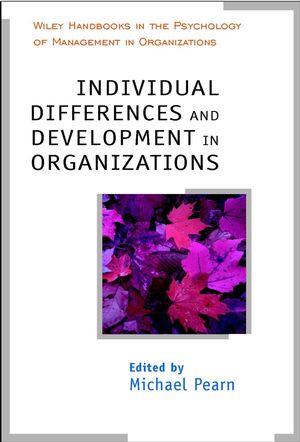Individual Differences and Development in OrganisationsISBN: 978-0-471-48540-7
Hardcover
424 pages
December 2002
 |
||||||
About the Editor.
About the Contributors.
Series Preface.
Preface.
Part I: Approaches, Concepts and Theory.
Learning Theory and the Construction of Self: What Kinds of People Do We Create through the Theories of Learning that We Apply to Their Development (J. Burgoyne).
Who Am I? Self-development in Organisations (M. Lee).
Cognitive Science and Individual Development (J. Henry).
Individual Differences Can Both Facilitate and Limit Individual Development (K. Murphy).
Part II: Individual Differences.
Old and New Models of Cognitive Abilities: the Assessment Conundrum (B. Torff and E. Warburton).
Personality, Style Preference and Individual Development (A. Furnham).
To Use Competencies or Not to Use Competencies? That Is the Question (P. Sparrow).
Emotional Intelligence and the Development of Managers and Leaders (V. Dulewicz and M. Higgs).
Part III: Assessment Tools and Processes.
Assessing Individual Development Needs (K. Van Dam).
Individual Asessement as a Integrated Tool in a Systematic Management Process (J. Iten).
Development Centres: a Neglected Perspective (J. Zaal).
Part IV: Development Methods and Processes.
Choosing a Development Method (A. Mumford).
Team-working and the Implications for Individual Development (R. Mottram).
Informal and Incidental Learning in the New Millennium: the Challenge of Being Rapid and/or Being Accurate! (V. Marsick, K. Watkins and J. Wilson).
Individual Development and Self-management Learning (I. Cunningham).
Using Social Networks in Organisations to Facilitate Learning (R. Poell and F. Van der Krogt).
Online Networking and Individual Development (G. Salmon).
Part V: Organisational Context.
Developing Individuals for Leadership Roles (C. McCauley).
Developing Innovations in Organisations (N. King).
Diversity and Individual Development (R. Kandola and S. Kartara).
Author Index.
Subject Index.
About the Contributors.
Series Preface.
Preface.
Part I: Approaches, Concepts and Theory.
Learning Theory and the Construction of Self: What Kinds of People Do We Create through the Theories of Learning that We Apply to Their Development (J. Burgoyne).
Who Am I? Self-development in Organisations (M. Lee).
Cognitive Science and Individual Development (J. Henry).
Individual Differences Can Both Facilitate and Limit Individual Development (K. Murphy).
Part II: Individual Differences.
Old and New Models of Cognitive Abilities: the Assessment Conundrum (B. Torff and E. Warburton).
Personality, Style Preference and Individual Development (A. Furnham).
To Use Competencies or Not to Use Competencies? That Is the Question (P. Sparrow).
Emotional Intelligence and the Development of Managers and Leaders (V. Dulewicz and M. Higgs).
Part III: Assessment Tools and Processes.
Assessing Individual Development Needs (K. Van Dam).
Individual Asessement as a Integrated Tool in a Systematic Management Process (J. Iten).
Development Centres: a Neglected Perspective (J. Zaal).
Part IV: Development Methods and Processes.
Choosing a Development Method (A. Mumford).
Team-working and the Implications for Individual Development (R. Mottram).
Informal and Incidental Learning in the New Millennium: the Challenge of Being Rapid and/or Being Accurate! (V. Marsick, K. Watkins and J. Wilson).
Individual Development and Self-management Learning (I. Cunningham).
Using Social Networks in Organisations to Facilitate Learning (R. Poell and F. Van der Krogt).
Online Networking and Individual Development (G. Salmon).
Part V: Organisational Context.
Developing Individuals for Leadership Roles (C. McCauley).
Developing Innovations in Organisations (N. King).
Diversity and Individual Development (R. Kandola and S. Kartara).
Author Index.
Subject Index.



